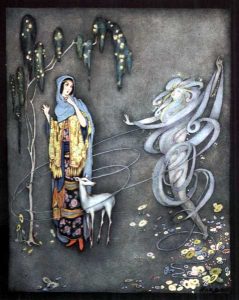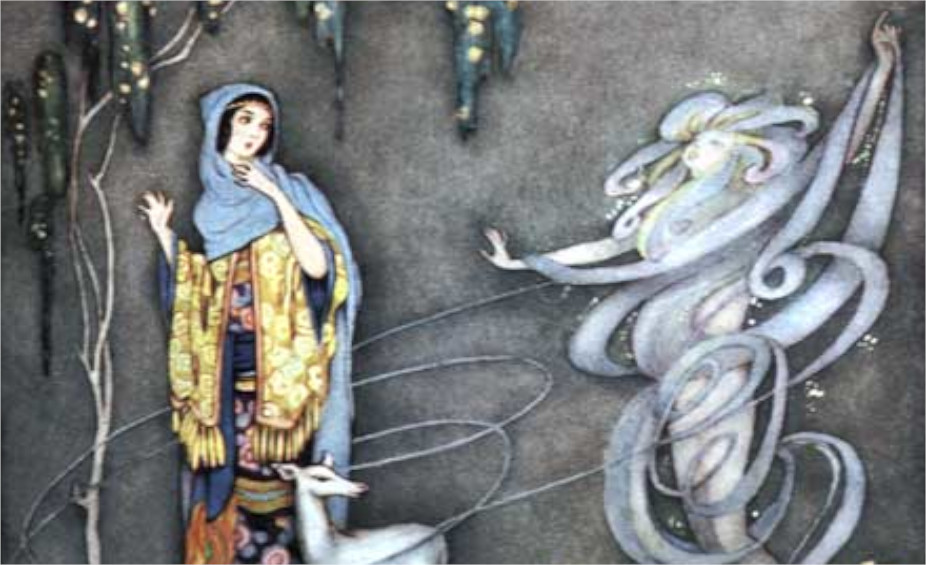The White Fawn

From “My Book of Favourite Fairy Tales”
By: Edric Vredenburg
There was once upon a time a King and Queen who were perfectly happy, with one exception, and that was that they had no child.
One day when the Queen was staying in a watering-place, some distance from home, she was sitting by a fountain alone, sadly thinking of the daughter she longed to have, when she perceived a crab coming in her direction, who, to the Queen’s surprise, addressed her thus:
“Great Queen, if you will condescend to be conducted by a humble crab, I will lead you to a Fairies’ palace and your wish shall be fulfilled.”
“I would certainly come with you,” replied the Queen, “but I am afraid that I cannot walk backwards.”
The crab smiled, and transforming herself into a beautiful little old woman, said:
“Now, madam, it is not necessary to go backwards. Come with me, and I beg of you to look upon me as your friend.” She then escorted the Queen to the most magnificent palace that could possibly be imagined, it was built entirely of diamonds.
In this superb place dwelt six Fairies who received the Queen with the greatest respect, and each one presented her with a flower made of precious stones—a rose, tulip, an anemone, a columbine, a violet, and a carnation.
“Madam,” they said, “we have pleasure in telling you that soon you will have a daughter whom you will name Desirée. Directly she arrives, do not fail to call upon us, for we will bestow all sorts of good gifts upon her. You have only to hold this bouquet, and mention each flower, thinking of us, and be assured that we shall at once appear in your chamber.”
The Queen, transported with joy, and overcome with gratitude, threw herself upon their necks, and warmly embraced them; she then spent several hours admiring the wonders of the palace and its gardens, and it was not until evening that she returned to her attendants, who were in a serious state of anxiety at the prolonged absence of Her Majesty.

Not very long afterwards, when the Queen was once more at home in her Royal Palace, a baby Princess was born, whom she named Desirée. Then taking the bouquet into her hand, the Queen, one by one, pronounced the names of the flowers, when there immediately appeared, flying through the air in elegant chariots drawn by different kinds of birds, the six Fairies who entered the apartment, bearing beautiful presents for the little baby. Marvellously fine linen, but so strong that it could be worn a hundred years without going into holes, lace of the finest, with the history of the world worked into its pattern, toys of all descriptions that a child would love to play with, and a cradle ornamented with rubies and diamonds, and supported by four Cupids ready to rock it should the baby cry. But, best of all, the Fairies endowed the little Princess with beauty, and virtue, and health, and every good thing that could be desired.
The Queen was thanking the Fairies a thousand times for all their favours, when the door opened, and a crab appeared.
“Ungrateful Queen,” said the crab, “you have not deigned to remember me, the Fairy of the Fountain; and to punish your ingratitude, if the Princess sees daylight before she is fifteen years old, she will have cause to repent it, and it may cost her her life. It was well I took the form of a crab, for your friendship instead of advancing has gone backwards.” Then in spite of all the Queen and the Fairies could say, the crab went backwards out of the door, leaving them in the saddest consternation, and it was long before they could decide what was best to be done.
Then, with three waves of a wand, the Fairies caused a high tower to spring up; it had neither door nor window, an underground passage was made, through which everything necessary could be carried, and in this tower the little Princess was shut up and there she lived by candlelight, where never a glimpse of the sun could come.
When the Princess Desirée was fourteen years old, the Queen had her portrait painted, and copies of it were carried to all the Courts in the world. All the Princes admired it greatly, but there was one Prince, named Guerrier, who loved it above everything; he used to stand before the picture and avow his passion, just as if it heard what he said, and at last he told the King, his father.
“You have resolved that I shall marry the Princess Noire, but this I can never do, so great is my love for the Princess Desirée.”
“But where have you seen her?” enquired the King.
The Prince hastened to fetch her portrait, and the King was so greatly struck by Desirée’s beauty that he agreed to follow his son’s wishes and break off his engagement with the Princess Noire, that he might wed the Princess Desirée. So the King despatched as ambassador a rich young lord named Bécafigue.

Bécafigue was devoted to Prince Guerrier, and he fitted out a most splendid retinue to visit the Princess Desirée’s Court. Besides numerous magnificent presents, Bécafigue took with him the Prince’s portrait, which had been painted by such a clever artist that it would speak; it could not exactly answer questions, but could make certain remarks. It was truly a speaking likeness of the young Prince. Desirée’s father and mother were delighted when they heard that the Prince Guerrier was seeking their daughter’s hand in marriage, for they knew him to be a brave and noble young man. But as it still wanted three months to the Princess’s fifteenth year, warned by the Fairy Tulip, who had taken Desirée under her special care, they refused to let him see their daughter or to let her yet marry the Prince Guerrier, but they showed her the Prince’s portrait, with which she was greatly pleased, and particularly when it said, “Lovely Desirée, you cannot imagine how ardently I am waiting for you; come soon into our Court to make it beautiful by your presence.”
When Prince Guerrier saw the ambassador return without Desirée, he was so terribly disappointed that he could neither eat nor sleep, and before long fell dangerously ill.
Meanwhile Desirée had no less pleasure in looking at the Prince’s portrait than he had had admiring hers, and this was soon discovered by those around her, and among others Giroflée and Longue Epine, her maids of honour. Giroflée loved her passionately and faithfully, but Longue Epine was full of envy of the Princess who was so good and beautiful, and, besides Longue Epine, Desirée had another enemy, and that was the Princess Noire, to whom Prince Guerrier had been betrothed. This Princess Noire now went to the Fairy of the Fountain, who was her best friend, and begged her to take revenge upon Princess Desirée, and this the Fairy promised to do. Meanwhile once more Bécafigue came to the capital where Desirée’s father lived, and throwing himself at the King’s feet, besought him in most touching words to let his daughter go with him at once to the Prince, who would surely die if he could not behold her.
When Princess Desirée heard of the Prince’s illness, she suggested that she should set out without delay, but in a dark carriage, that only at night should be opened to give her food. This plan was approved of; the ambassador was told, and he departed full of joy. So in a carriage like a large dark box, shut up with her Lady in Waiting and her two Maids of Honour, Giroflée and Longue Epine, Princess Desirée departed for Prince Guerrier’s Court.
Perhaps you will remember that Longue Epine did not like Princess Desirée, but she greatly admired Prince Guerrier, for she had seen his portrait speaking, and she had told her mother, the Lady in Waiting, that she should die if he married Desirée.
The King and Queen had begged the Lady in Waiting to take the greatest of care of their dear daughter, and above all to be heedful that she did not see the light of day until her fifteenth birthday, saying that the ambassador had promised that until then she should be placed where there was no other light than that of candles. But now as they drew near their destination, while it was broad daylight the wicked woman, urged by her envious daughter, Longue Epine, all at once took a large knife which she had brought for the purpose, and with it cut the covering of the carriage.
Then, for the first time, the Princess Desirée saw the light of day!!! Hardly had she perceived it when, uttering a deep sigh, she threw herself from the carriage, and in the form of a white fawn fleetly fled into a forest near by.
The Fairy of the Fountain, who was the cause of this disaster seeing that all who were accompanying the Princess were about to hasten to the town to tell the Prince Guerrier what had happened, called up a great thunderstorm and scattered them in every direction. Only the Lady in Waiting, Longue Epine and Giroflée were left, Giroflée, who ran after her mistress, making the trees and rocks echo with her mournful calls. Then Longue Epine clothed herself in the rich bridal robes provided for Desirée. She placed the crown upon her head, the sceptre and orb she carried in her hands, so that all should take her for the Princess. With her mother bearing her train she gravely walked in the direction of the town.

They had not gone far when a brilliant procession came towards them, amongst whom was the sick Prince in a litter, and to those in advance Longue Epine announced that she was the Princess Desirée, with her Lady in Waiting, but that a jealous Fairy had sent a thunderstorm which had destroyed her carriage and scattered her other attendants. When the Prince was told of this, he could not refrain from saying to the messengers: “Now acknowledge, is she not truly a miracle of beauty, a Princess beyond compare?”
No one replied at first, and then one of the boldest said,
“Sir, you will see; apparently the fatigue of the journey has somewhat changed her.” The Prince was surprised, but when he saw Longue Epine words fail to express what he felt.
She was so tall that it was alarming, and the garments of the Princess hardly came to her knees. She was frightfully thin, and her nose, which was more hooked than a parrot’s beak, shone like a danger signal. Then her teeth were black and uneven, and, in fact, she was as ugly as Desirée was beautiful.
At first the Prince could not speak a word, he simply gazed at her in amazement. Then he said, turning to his father, “We have been deceived, that portrait was painted to mislead us. It will be the death of me.”
“What do I hear, they have deceived you,” fiercely exclaimed Longue Epine.
“It is not to be wondered at,” remarked the King, “that your father kept such a treasure shut up for fifteen years.”
Then he and the Prince turned towards the town, and the false Princess and the Lady in Waiting, without any ceremony, were mounted each behind a soldier and taken to be shut up in a castle.

Painted by Jennie Harbour
Soon after his terrible disappointment, Prince Guerrier, unable to bear any longer the life at court, secretly departed from the palace with his faithful friend Bécafigue, leaving a letter for his father saying he would return to him as soon as his mind was in a happier state, and begging him meanwhile to keep the ugly Princess prisoner, and think of some revenge upon the deceitful king, her father.
After three or four days’ journeying, the wanderers found themselves in a thick forest. Quite wearied out, the Prince threw himself upon the ground, while Bécafigue went on further in search of fruit wherewith to refresh his royal master.
It is a long time since we left the White Fawn, that is to say the charming Princess.
Very desolately she wept when in a stream she saw her figure reflected, and when night came she was in great fear, for she heard wild beasts about her, and sometimes forgetting she was a fawn she would try to climb a tree. But with morning dawn she felt a little safer, and the sun appeared a marvellous sight to her from which she could hardly turn her eyes. But now the Fairy Tulip, who had always loved the Princess guided Giroflée’s feet in her direction, and when the White Fawn saw her faithful Maid of Honour her delight was boundless.
It did not take Giroflée long to discover that this was her dearly-loved mistress, and she promised the White Fawn never to forsake her, for she found she could hear all that was said although she could not speak. Towards night the fear of having no shelter made the two friends so dreadfully dismayed that the Fairy Tulip suddenly appeared before them.
“I am not going to scold you,” she said, “although it is through not following my advice that you are in this misfortune, for it goes to my heart to see you thus. I cannot release you altogether from this enchantment, but I have power to shorten the time, and also to say that during the night you may regain your rightful form, but by day again must you run through the forest as a Fawn.” The fairy also told them where they could find a little hut in which to pass the nights. Then she disappeared. Giroflée and the Fawn walked in the direction the Fairy had pointed out, and arrived at a neat little cottage where an old woman showed them a room which they could occupy.
As soon as it was night Desirée came to her rightful form, but when day appeared she was once more a Fawn and, escaping into the thicket, commenced to run about in the ordinary way.
You have heard how Prince Guerrier rested in the forest while Bécafigue searched for fruit; quite late in the evening Bécafigue arrived at the cottage of the good woman who had given shelter to Giroflée and the White Fawn. He addressed her politely and asked for the things he required for his master. She hastened to fill a basket, and gave it to him, saying, “I fear that if you pass a night without shelter some harm may come to you. I can offer you a poor one, but at any rate it is secure from the lions.”
Bécafigue went back to the Prince and together they returned to the cottage, where they were led into the room next to that occupied by the Princess.

Next morning the Prince arose early and went out; he had not long been in the forest when he saw a beautiful little Fawn. Hunting had ever been his favourite pastime, and now he pursued the little creature. All day long hither and thither he chased, but did not succeed in capturing her, and as evening fell the Fawn slipped away and gained the little hut where Giroflée anxiously awaited her, and on hearing her adventure the Maid of Honour told her she must never again venture out, but the Princess replied:
“It is no use talking thus, when I am a Fawn this room is stifling to me and I must depart from it.”
The next day the young Prince sought in vain for the White Fawn, and finally tired out threw himself upon the grass and fell asleep.
While he lay there the little Fawn drew near and looking at him quietly, to her astonishment she recognised his features as those of the Prince Guerrier. Coming nearer and nearer she presently touched him and he awoke.
His surprise was great at seeing close by the shy little Fawn, who stayed not an instant longer but fled away, the Prince following.
“Stay, dear little Fawn,” he cried, “I would not hurt you for the world.” But the wind carried off the words before they reached her ears. Long he chased the poor creature, till at last worn out the Fawn sank down on the ground and the Prince came up to her.
“Beautiful Fawn,” said he, “do not fear me, I shall lead you with me everywhere.” Then he covered her with roses and fed her with the choicest leaves and grasses.
But as evening drew near the Fawn longed to escape, for what would happen should she suddenly change into a Princess there in the forest. Presently the Prince went to fetch some water for her, and while he was gone she ran homewards. The next day for a long time she hid from the Prince, but at last he found her, and as she dashed off he shot an arrow which wounded her in the leg.
Sad that he should have done so cruel a thing, the Prince took herbs and laid them upon the wound, and at last he went to fetch Bécafigue to help him carry her to the house. He tied her to a tree.
Alas! Who would have thought that the most beautiful Princess in the world would be treated thus? While she was straining at the ribbons trying to break them, Giroflée arrived, and was leading her away when the Prince met them and claimed the Fawn as his.
“Sir,” politely replied Giroflée, “the Fawn was mine before it was yours,” and she spoke to the Fawn, and the Fawn obeyed her in such a way that the Prince could not doubt that what she said was true. Giroflée then went on, and, to the surprise of the Prince and Bécafigue, entered the old woman’s house where they themselves lodged. Then Bécafigue told the Prince that unless he was much mistaken the owner of the Fawn had lived with the Princess Desirée when he went there as ambassador.

“I mean to see her again,” said Bécafigue, “there is only a partition between her room and ours.” And soon he had made a hole large enough to peep through, and through it he saw the charming Princess dressed in a robe of brocaded silver, with flowers embroidered in gold and emeralds, her hair falling in heavy masses on the most beautiful neck in the world. Giroflée was on her knees before her, bandaging up one arm from which the blood was flowing. They both seemed greatly concerned about the wound: “Let me die,” the Princess was saying, “death would be better than the life which I lead. To be a Fawn all the day, to hear him speaking, and not to be able to tell him of my sad fate.”
One can guess the astonishment of Bécafigue and of the Prince. Guerrier would almost have died of pleasure had he not thought that it must be some enchantment, for did he not know that Desirée and her Lady in Waiting were shut up in the castle.
He went softly and knocked at the chamber door, which Giroflée opened, thinking it was the old woman, for she required help for the wounded arm.
The Prince entered, threw himself at Desirée’s feet, and found she was indeed his Princess.
Great was their joy thus at last meeting, and while they were talking to each other the night passed, and the day dawned, and daylight came, and the morning sun shone brightly before Desirée had time to notice that she had not again taken the shape of a Fawn, but was her own beautiful self.
Then it was found that it was the Fairy Tulip in disguise of the old woman who had provided that sheltering cottage in the forest.
The joy of the King upon once more seeing his son can well be imagined, and the marriage of the Prince and Desirée, and Bécafigue and Giroflée took place on the same day, the Fairies giving their diamond palace as their wedding present to Princess Desirée, and Fairy Tulip presenting four gold mines in the Indies to Giroflée.
And, in accordance with the wish of Princess Desirée, Longue Epine and her mother, the false Lady in Waiting, were set at liberty.

